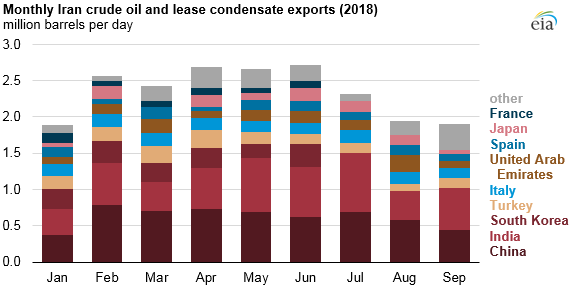The United States is poised to grant waivers to India and South Korea that will allow the countries to continue buying oil from Iran, despite the renewal of U.S. sanctions next week, according to news reports.
The Trump administration gave oil buyers 180 days to wind down purchases of Iranian crude in May, when President Donald Trump announced he was abandoning a nuclear accord with Iran and restoring sanctions on its economy. The administration told importers to completely cut off purchases by Nov. 4, but it is widely expected to allow some countries to continue reducing purchases beyond that date.
On Thursday, the Economic Times reported that the administration will allow India to purchase 1.25 million tons of Iranian oil each month through March. A source told the English-language Indian newspaper that India and Washington have "broadly agreed on a waiver" and that "India will cut import by a third."
India, the second largest purchaser of Iranian oil, imported about 22 million tons from Iran in the 2017-2018 period, according to the paper.
High crude prices and a deteriorating Indian rupee have caused oil price inflation in the country and sparked protests over fuel costs. While Brent crude is trading at about $75, India is essentially paying double that after inflation, Fatih Birol, executive director of the International Energy Agency told CNBC this week.
The payment mechanism remains uncertain, but India is expected to continue paying for Iranian oil in euros and rupees, sources said. Iran would use rupees to pay for rice, drugs and other items, while the balance of revenues would be held in escrow until sanctions are lifted, the Economic Times reported.
Bloomberg News later reported that South Korea, in addition to India, has agreed to the outlines for a waiver with the United States. Bloomberg also reported that funds from Indian imports would go into an escrow account.
Sources told both news outlets an announcement from the administration could come in the next few days. The State Department did not immediately return a request for comment.
Several other oil importing nations are also seeking waivers.
Japan's top spokesperson for the government on Thursday said the nation had yet to receive a waiver, Reuters reported. China, Iran's biggest oil customer, has also sought a waiver, and its biggest refiners have reportedly halted imports in November until Beijing gets clarity from Washington.
U.S. sanctions have cut Iran's exports by roughly a third, with shipments shrinking to roughly 1.7 million to 1.9 million barrels per day by the end of September, according to estimates from several sources.

The sanctions were developed by the Obama administration, which marshaled international support for the policy in order to put pressure on Iran to negotiate restrictions on its nuclear technology program. The United States and five world powers reached a deal with Iran in 2015 that paved the way for sanctions relief the following year.
The Trump administration, hoping to secure a tougher nuclear accord and force changes to Iran's foreign policy, pulled the United States out of the accord in May over widespread international objection. The European Union is trying to preserve the nuclear deal, but the continent's multinational companies have dropped business ties with Iran under threat of U.S. sanctions.
The Obama administration allowed some foreign firms to gradually wind down their purchases from Iran so long as their home country reduced imports by 20 percent every 180 days. The Trump administration has not announced hard terms for waivers.
via IFTTT
No comments:
Post a Comment